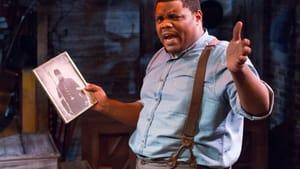Stay in the Loop
BSR publishes on a weekly schedule, with an email newsletter every Wednesday and Thursday morning. There’s no paywall, and subscribing is always free.
Civil War diary
The Walnut Street Theatre presents James R. Harris’s ‘Civil War Voices’

First produced at Doane University in Nebraska in 2008, Civil War Voices has quite a production history, playing mostly at colleges and small community theaters around the country. The show, now onstage at the Walnut’s Studio 3, evolved from the diary of Alabama plantation owner Joseph Harris, discovered by his great-great nephew, playwright James R. Harris.
The modern-day Harris combined the firsthand accounts of his ancestor with the journals and letters of others from the Civil War period and brought to life some of the true stories of people who lived through this cataclysmic American trauma.
History sings
Mark Hayes, the arranger of the traditional songs in the show, brought a unique sensitivity and reharmonization of this music. All the performers in this show sounded wonderful, whether singing solo or negotiating intricate harmonies.
This ensemble production animates the lives of Elizabeth Keckley (sympathetically played and powerfully sung by Jessica Johnson), born enslaved, who became Mary Todd Lincoln's seamstress and friend. Ben Sheppard, a fine singer and upright bassist, brings Joseph Harris to life. Theo and Harriet Perry (Laura Giknis and Matthew Mastronardi) were a young married couple separated by the war, in performances exploring the humorous homespun of their lives as well as the tragic consequences of war.
Mastronardi also plays piano for the ensemble throughout the production and easily segues from the keys to delve deep into his other characters. Bringing a representative of the North into the story, Philly native Damon Bonetti plays Joshua Chamberlain, a Maine college professor who was a hero at the famous defense of Little Round Top at Gettysburg. Bonetti also plays Abe Lincoln in this production, as all the players here bring to life different people important to the collective story of the war.
Musical highlights
With powerful presence onstage, Nichalas L. Parker plays the Narrator, who keeps the action moving. He’s an outstanding singer (and conga player!) and is one of the few actors whose voice is able to carry above the instruments being played a little too loudly by the other actors. Maybe I had difficulty hearing because I was sitting near the snare drum, but it seemed to me the voices and instruments need more acoustic balance.
Highlights of the show include “Oh Freedom,” a post-Civil War freedom song made popular during the civil rights movement by Odetta and sung with fire by Jessica Johnson; and “He’s Gone Away,” a very old Appalachian ballad lovingly sung by Giknis and Mastronardi, who brought chills and tears to this listener. “When Johnny Comes Marching Home,” a definitive Civil War song by bandleader Patrick Gilmore, is deftly and powerfully led by Ben Sheppard, with a ruefully bittersweet accompanying piano that turns the rousing march tune on its head into a sad commentary on war and its aftermath.
Later in the run
All in all, the ensemble does a fine job, although the first act was a bit rushed on opening night, and many of the words taken from the diaries and letters couldn’t be understood. There was also some sound-effect bleed-through from the Walnut’s mainstage—like birds chirping at inappropriate times. Right after a poignant speech by Joshua Chamberlain on the victory at Little Round Top, a cow mooed, destroying the powerful moment with puzzled looks from the audience.
But those little mishaps pale because this cast is so good. During the run of this final offering of the season at Independence Studio on 3, the performances will only grow deeper and more moving, bringing the struggles of Civil War-era Americans alive for audiences today.
What, When, Where
Civil War Voices. By James R. Harris, directed by Bill Van Horn. Through May 26, 2019, at the Walnut Street Theatre, 825 Walnut Street, Philadelphia. (215) 547-3550 or walnutstreettheatre.org.
The Walnut is an ADA-compliant venue. If you need wheelchair seating, call (215) 574-3550 ext. 6, rather than ordering online, and staffers will assist you.
Sign up for our newsletter
All of the week's new articles, all in one place. Sign up for the free weekly BSR newsletters, and don't miss a conversation.

 Suzanne Cloud
Suzanne Cloud